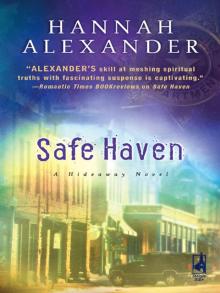- Home
- Hannah Alexander
Grave Risk Page 9
Grave Risk Read online
Page 9
Jill’s teeth clenched at his words. Did he realize how patronizing he was being? Yes, she did have a few hang-ups, but did he think she was too dense to pick up on his doubts?
“Nothing and no one in the house now, boss,” Tom said, holstering his shooter. “I’ve been upstairs and into every room. Definitely no signs of forced entry.”
“That fast?” Jill asked. The officers had barely been here five minutes.
Tom nodded. “Done my share of searches. Whoever was here, they’ve already gone.”
“Did you check the attic?” she asked.
“Sure did. Not a single sign of dust bunnies or cobwebs. Jill, you keep a clean house.”
“Why don’t we look around and see if you notice if anything’s missing?” Greg suggested.
She went slowly through the house, flanked by the two men; Greg behind her, Tom in front. If she didn’t know better, she’d have thought they were taking her seriously.
She stopped at the closet beneath the stairwell. “That door’s ajar. It wasn’t that way when I left today.”
“Sorry,” Tom said. “I’m bad about not closing doors behind me.”
“Was it closed when you first saw it?” she asked.
He hesitated. “I’m sure it was.”
“How sure?”
The two men made eye contact and said nothing.
Suppressing a sigh, she glanced inside the closet, turning on the light to reveal her filing cabinet, which held financial records for the past seven years. Most people around here knew she was one of the owners of Cooper Enterprises, which consisted of a busy sawmill operation and a cattle ranch of two thousand acres. Most people should also know she wasn’t naive enough to leave valuables around the house.
Still, she went through the files to see if anything had been taken, feeling uncomfortable as the sheriff and deputy watched her every move. Did they feel she was wasting their time? She’d never been a people pleaser, but she didn’t want to be considered an alarmist.
After completing a search of the files, she walked with the men back into the sitting room. “Nothing is missing as far as I can tell.”
“Any idea who might have come in?” Tom asked.
She could hear the doubt in his voice. “If I’d known, I’d have told you.” She also heard the irritation in her tone.
Stop it, Jill. It won’t do to tick off the town’s protection. Still, she couldn’t dismiss the knowing glance she’d caught them sharing over her head.
“What about Noelle?” Tom asked. “Think she might’ve paid you a visit? That’s been known to happen.”
She cringed at his condescending tone. Yes, Noelle had used her key to come inside one day last spring to pick up some records for the bank and had neglected to tell Jill. Calling the sheriff about it hadn’t exactly endeared her to Tom and Greg.
“I know, but Noelle hasn’t had an opportunity today to come to the house since I left this morning. She’s been at the funeral. Besides, she’s learned her lesson. She always tells me when she’s coming to get something.”
“We’ll look around the yard and ask the neighbors if they saw any suspicious cars around the area,” Greg said.
“Most of them were at the funeral. Look, Greg, I know it isn’t that obvious to you, but I remember exactly how this house looked when I left this morning to help set up for the funeral dinner. I never leave my curtains that way.” She pointed to the heavy drapes in the sitting room window—thick enough that no light spilled out onto the porch at night when she read by the fireplace.
Greg removed his hat. “Now, Jill, do you think it’s possible you could be just a little overwrought with all that’s happened lately? I know I’ve been on edge, just waiting for something else to come down on us.”
“I’m not being paranoid about this.”
He lowered his brows and gave her an entreating look.
“Okay,” she said, unable to keep herself from glancing behind the kitchen door, and studying the shadows beside the sitting-room sofa. “I could be a little jumpy, but you know how…particular I can be about some things. The way the drapes hang is one of them.”
Again, a knowing look passed between the men. Fine. What made her think she could expect anything else?
Greg turned to her then, his manner fatherly and gentle, although he was four years younger than she. And there was a slight hint of reproach in his expression.
“Look, I know Edith’s death has you upset. You two were always close.”
“I’m still not convinced her death was from natural causes.”
“So you’re upset because we didn’t ask for an autopsy?” Tom asked.
“I’m not upset,” she snapped. Since they didn’t share her opinion that an autopsy was indicated, they obviously thought she was pressing the point. Did they think she was making all this up just to convince them there was danger afoot?
Greg held her gaze for a few seconds, then glanced away.
“I see. You think this is all in my head.” Often in her life, Jill had felt isolated from the rest of the world. Why wasn’t she accustomed to that feeling by now?
“It’s going to be okay, Jill,” Greg said, still placating her. He placed a beefy hand on her shoulder. For him, it wasn’t an intrusive or intimate gesture, just typically friendly and kind. “Give yourself some time to recover, okay? Tom and I aren’t so busy most days that we won’t come if you need us to.”
Even as she wanted to be comforted by the kindness of his voice, she felt as if she were being cut adrift. He wasn’t taking her seriously. Nothing worse than she had expected, but still, it stung. She silently prayed she wouldn’t need to depend on Greg and Tom for anything else.
Chapter Thirteen
The noise level had increased in the dining room of the bed and breakfast, if that were possible. Fawn saw Edith’s nieces and nephews and great-nieces and great-nephews clustered around the tables out on the deck that overlooked the lake. One of the men, a chubby guy with black hair, who had spoken at the funeral about his aunt, departed from the lodge alone.
The rest of the family stayed on the deck. Fawn didn’t blame them. The shady deck on a pretty day was a lot better than sitting in a crowded dining room with a bunch of noisy strangers. Edith’s relatives weren’t from around Hideaway.
Back when Fawn was a newcomer, she’d tried to avoid the strangers, as well. Bertie and Edith had put an end to that in a hurry. With their help and Karah Lee’s encouragement, Fawn had quickly made friends. She’d discovered that quite a few of the church people—and most of the people in this town were church people—welcomed her. They wouldn’t let her get away with much, but most of them eventually accepted her as one of them.
Nothing like she’d expected church people to behave. She’d gone to church once, in Vegas, just to please a guy she was seeing. Apparently, she hadn’t worn the right clothes. How was she supposed to know how to dress? When she’d walked into the sanctuary of the church in a short skirt and camisole, an older, well-dressed woman looked as if she were about to lose her eyeballs. The guy Fawn attended with never asked her out again. The poor guy might have fainted if he’d known her profession at the time.
When Fawn was growing up, she’d only attended church when her Great-Grandma June took her, and that wasn’t often, because Mom complained about Granny June “filling Fawn’s head with all that Jesus garbage.”
So Fawn had decided long ago that she didn’t belong inside a church building.
Now, thanks to the Hideaway grapevine, most everybody in town knew her background. Sometimes she felt as if she had twenty mothers and ten grandmothers—interfering mothers and grandmothers. She suspected Bertie and Edith had used their influence with the locals to get her accepted. They’d certainly used all their influence with Karah Lee to get Fawn to their church for the first time.
She grinned at the ladies standing around the buffet table, just waiting to refill a pan if food got low. She picked up a tray and set two plates on it. She
wasn’t really hungry, but Bertie probably wouldn’t want to eat alone.
She knew how those ladies felt, standing back there, looking out for the needs of everyone here. She loved doing that. It was something she’d discovered last year, when she started working for Bertie for some extra money.
She loved this part of the business most of all. Blaze said it was because she craved acceptance, and that was the best kind of acceptance she could get. Sometimes Blaze thought he was some kind of shrink.
As she selected some green beans and roast beef so tender it could practically be eaten with a spoon, she decided she did have an appetite, after all. Then she saw Austin Barlow, with no food in his hands, leaning over the table where Mr. and Mrs. Marshall sat.
Mary Marshall’s face looked as if she smelled something bad—not much of a change from her usual expression. Jed shook his head, glowering. Austin leaned closer, face reddening. Some people from other tables looked in their direction.
Hmm. This could be interesting….
“How about some of this dessert?” came a voice from behind Fawn.
She turned to see one of the church ladies—Melva Cooper—holding out a serving spoon of cherry dump cake. Melva was married to Jill’s cousin. She was fluffy and comfortable, like the food she cooked. She had a kind smile, and her stepchildren adored her.
“Sure, Melva. I’ll take some for Bertie, too. She loves this stuff.”
By the time Fawn turned back to glance across the dining room toward the interesting conversation taking place, Jed and Mary Marshall were leaving, and Austin stood watching them go.
He looked frustrated. Once again, Fawn felt sorry for the man. It didn’t look as if the whole town was accepting his return with open arms, as he seemed to hope.
Settled back in the lobby alcove with Bertie, Fawn stuck a fork into the roast beef. “Bertie, what do you know about the Marshalls?”
The older lady looked up from her plate. “I know Mary’s an artist with desserts.” She raised a spoonful of cherries and cake. “See this here stuff? Melva Cooper can do a dump cake. All she has to do is dump cake mix, cherries and butter into a greased cake pan, stir it a tiny bit, then bake it.
When people rave about it, Melva just glows. It makes her whole day. It doesn’t take much for Melva.”
“She’s nice.”
“Now, our Mary, on the other hand, will spend hours and hours on her desserts, fancy cakes and pies and pastries. She can cook like some famous chef. Oughta be on television. You know, one of those cookin’ shows. But when anyone tries to compliment her on one of her cakes or pies, she gets all grim and points out exactly why she thinks they’re wrong.”
“Has she always been so grumpy?”
The white brows drew together. “Grumpy? That’s how you see her?”
“She never smiles, never says boo to me.”
Bertie shook her head sadly. “When I look at Mary Marshall, I see someone who’s always trying hard to do the right thing, and is never satisfied with the results. She wants so badly to please, and she’s constantly frustrated because she doesn’t think she measures up.”
“Who’s she trying to please?” Fawn asked. “I’d think she’d smile and be nice if she were trying to please somebody.”
“It ain’t us. It seems to me it’s God she’s hoping to satisfy, but I think she’s tryin’ to do it under her own steam. She hasn’t realized yet that nobody’s perfect.”
“So I guess nobody else measures up to her standards, either,” Fawn said.
Bertie shook her head sadly. “Only person she’s ever shown open approval of was Sheena, and I think that’s one reason that girl hasn’t moved out on her own yet. She can’t bear to disappoint her mother.” Bertie took a bite of the scalloped potatoes.
“I still say Mary’s a grump.”
Bertie gave her a look over the rim of her glasses. “Can’t all people be cheery and bright all the time. It ain’t in their nature. Some people are just cursed with the blues.” Bertie spooned a bite of the dessert into her mouth and closed her eyes as if to savor it.
Fawn felt sorry for Mary.
“I met Mary when her folks sent her to Sunday school,” Bertie said. “Quite a few years ago. I was a Sunday-school teacher in those days. Mary was a sweet little child. It wasn’t until she was all grown up that I met her on the street one day, and wondered what happened to the real Mary.”
Fawn finished her meal listening to the racket in the dining room. She wondered how Edith’s family must feel, sitting out on the deck, listening to the chatter getting louder. Laughter squeezed through the talk like butter melting into freshly toasted bread.
“Bertie, what are you going to do about this place now?” Fawn asked when the noise level dropped enough that she could actually hear herself.
Bertie sat back with a tired sigh and glanced around the room, plushly furnished with elaborate Victorian pieces that were surprisingly comfortable. “Don’t rightly know. There’s a lot of work that goes into this place, and while I can keep parts of it going, I depended on Edith for a lot.”
“Will her family be taking over her part of it?”
“Nope. They told me this morning that the business is all mine now. She left her part to me.”
“Can she do that?”
“She could do anything she wanted with her own money. Besides, most of her nieces and nephews are very well off. They don’t want for much. They’re nice people, and offered to help me with the transition.”
Fawn couldn’t miss the way Bertie’s gaze roved along the walls and fixtures, the doors and windows, lingering on a portrait of herself and Edith standing on the porch the day the deal closed on this bed and breakfast.
“You still love this place, don’t you, Bertie?”
“’Course I do. We ain’t had it long enough to get disenchanted with it. Edith and I fixed this place up the way we liked. I’ve always loved Victorian, and Edith had a way with colors and decorating.”
“What if you still had someone to help you with it?” Fawn asked.
“I’ve got help, and I could hire more, if it came to that. But you know what? I’m a tired old woman, working far past her prime. Shoot, Edith and I were too old when we bought this business. Now I’m the one responsible for the whole shebang. I don’t want all that responsibility.”
Fawn picked up Bertie’s discarded, half-empty plate and set it on top of her own. “So what are you saying?”
“I’m saying the spirit might be willing, but the body ain’t goin’ along with it much longer. Austin mentioned I might want to sell.”
“What?” Fawn stiffened. Even though she felt sorry for that man, Blaze didn’t trust him, and she shouldn’t, either. “Is he trying to get you to list with him?”
Bertie shook her head. “He didn’t say a thing about that. He just said I might want to check with him if I was thinkin’ about sellin’, because he’d make sure I got a good deal.”
Sure he would. “And you trust him?”
Bertie gave her a sharp glance. “Didn’t say that, but I can’t deny there seems to’ve been a change take place in that man since he left town two years ago.”
“Blaze says it takes more than a few days to take the measure of a man’s worth. Or maybe that’s word. Anyway, I think he’s saying let Austin prove himself for a while.”
“You think I don’t know that?”
Fawn shrugged. “What if you didn’t sell the place right away?”
“Doubt there’d be a problem sellin’. This here’s a goin’ business, and there’ve been plenty of investors lookin’ to make a deal with us just this past summer.”
“Ever heard of sweat equity?”
Bertie gave Fawn a pointed look. “Sure have. It’s the only way I know how to run a business. I’ve sweated enough in my lifetime, don’t you think?”
“Well, what if you were to find someone else to do the sweating so you wouldn’t have to? You keep receiving plenty of income from the business, and
you could retire anywhere you wanted to, or you could stay right here on the property in your own cottage and talk to the lodgers when they come in.”
“Why would I want to do that?”
Fawn fingered the edge of the heavy paper plate, suddenly unwilling to meet Bertie’s gaze. “Because you love this place and you don’t want to leave it. You’re always saying that the reason you love it so much is because of the people.”
“I’d end up working. Besides, who’d be crazy enough to let me stay here without doin’ the work?”
“Someone who loves this place, and loves you, and doesn’t have any money to buy it.” She looked up then.
Bertie’s eyes narrowed. “You know anybody like that?”
“Well, now that you mention it, I might just know someone who’d be crazy enough to do it.”
Bertie leaned forward. “Someone who’d love this place enough to work themselves to death keepin’ it goin’?”
“Someone like that. Yes.”
“Mind tellin’ me who this crazy person might be?”
“That would be me.”
For a moment, Bertie’s sharp eyes brightened with something like joy. Even pride. Or maybe just amusement.
“What do you think, Bertie? You wouldn’t have to draw up any legal papers or anything.”
“Oh, honey.” Bertie slumped and shook her head. “Honey, it’s just not gonna happen that way.”
“But it could work—”
“I’m not saying it couldn’t work. You’d do a good job. I’ve never seen a harder worker, unless maybe it was Blaze. But Fawn Morrison, you’ve got your whole life ahead of you, with schoolin’ and—”
“I can do that, too. Blaze is. He works at the ranch, and at the clinic, just to get what he calls practical experience. Jill Cooper went all the way through college, living right here in Hideaway. I’m going to the same school she did. Same school Blaze is going to. It can be done.”
A burst of laughter suddenly rang out from the dining room as Bertie hesitated. For an agonizing few seconds, Fawn held her breath.

 Silent Pledge
Silent Pledge Eye of the Storm
Eye of the Storm Fair Warning
Fair Warning Double Blind
Double Blind Grave Risk
Grave Risk Hideaway Home
Hideaway Home Death Benefits
Death Benefits Note of Peril
Note of Peril Hideaway
Hideaway Solemn Oath
Solemn Oath The Wedding Kiss
The Wedding Kiss Last Resort
Last Resort Sacred Trust
Sacred Trust A Killing Frost
A Killing Frost Safe Haven
Safe Haven